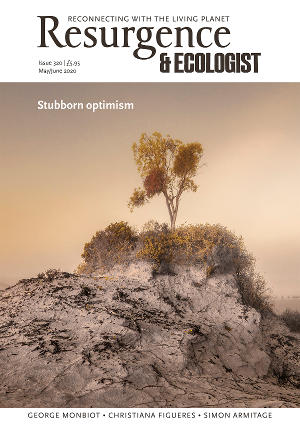Thirteen authors involved in the Climate Psychology Alliance, based in the UK, Australia, the USA and the Netherlands, all testify to a palpable fact: that climate breakdown and species extinction is the mother of all difficult conversations to have with family, friends and colleagues. The facts and the exponential speed with which they are enveloping us take us way out of our comfort zones. Whilst many of us are not indifferent to this situation, maybe our responses and reactions are more complicated and ambivalent than we would wish, and the fact remains that millions of people are unable to address their emotional response to this crisis at all. So how can we make talking about all this easier? Such is the subject of Climate Psychology: On Indifference to Disaster.
Paul Hoggett writes: “Perhaps the greatest mystery of our time is our species’ apparent equanimity and indifference in the face of climate disaster. We know that eco-anxiety is increasing widely to high alert, with denialists doubling down on their perverse strategies, while most of us who are ‘woke’ sometimes get caught in waves of distress, perhaps with tendencies to personal defensive strategies such as splitting (knowing and not knowing, in order to carry on) and projection (blaming some other).”
Different research methods are deployed to discover climate psychology truths. All the methods described in this book have in common that the results are not statistically significant and based on large-scale questionnaires, but instead their significance is based in nuanced, reflexive, empathic listening that invites personal stories in all their richness, perplexity and complexity, with the interviewer/researcher being present with their subjectivity too.
There are interviews with many different sectors of society, including children, people guided by Nature, Republicans in the USA who are conflicted about not wanting interference in personal liberty yet who see that the natural environment needs state protection, councillors in south Devon dealing with austerity-punished local services who know that these services need top priority, climate scientists who are emotionally reserved and climate activists who are more open – both groups tending to exhaustion – and people somewhat aware of the facts but who proceed defiantly, ambivalently or confusedly.
In a recent Guardian leader column commenting on 2019 having been the second-hottest on record for the planet’s surface and the hottest ever for the oceans, the contributor mused: “It is increasingly difficult to understand why any rational person would not be behind all and any measures designed to reduce carbon emissions.” The clue is the word ‘rational’. Western climate psychology shows how people try to cling to brain-based reason split from body-based wisdom when they don’t feel emotionally safe. Merely giving people facts when they are disengaged from them does not cause behavioural change. We need to feel relationally well enough held to be able to digest and process what we are being told. This book explains our not-so-rational nature with story-making, the relationality of psychosocial studies, defensive strategies psychoanalytically observed, and the dream alchemies of Jungian psychology – opening our intuition, imagination and empathy to our innate Nature-connectedness.
There are no big, wish-fulfilling idealisations in this book. Instead, there are thoughtful reflections to help us manage the subject of the climate crisis in our relationships so that through well-contained, non-judgemental engagement we can care for Nature more creatively.







